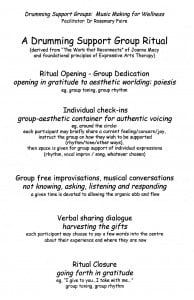Self-work, self-care and peer supervision for helping professionals
During my time teaching and coordinating the MA in Music Therapy at UTS, I developed a strand of the course involving “self-work, self-care and peer supervision” which aimed to foster resilience in our graduates and prevent burnout. Methods were adapted from my background in Somatics, Expressive Arts Therapy and Deep Ecology. I summarised this work in a 2012 conference presentation entitled
Reweaving inner and outer connections: Building resilience through deeper self-knowing and peer supervision groups
Here is the 2012 Conference handout for that presentation.
Individual and Group Arts-based Supervision Sessions
I currently offer individual and group arts-based supervision sessions from rooms in the Mosman area of Sydney, or via Skype.
If you are a helping or teaching professional and have a colleague or a group of colleagues who wish to support each other’s work through arts-based peer supervision, I can give you and your colleague(s) some initial guidance on how to use Expressive Arts Therapy frameworks and methods. I have put together a summary e-book which is available in conjunction with these supervision sessions.
I can be contacted via email for further details:
The Presentation
The following paper describes in detail the background, theory and practice of Expressive Arts Therapy methods in an MAMT subject called “The Arts in Supervision and Self-work”:
Faire, R. (2012). “The Presentation”: an intensive arts-based rite of passage adapted for the training of Music Therapists. Voices: A World Forum For Music Therapy, 12(1). https://voices.no/index.php/voices/article/view/630/518
Drumming Support Groups can be another way to structure peer supervision. I have developed a ritual for such groups based on the work of American Buddhist scholar and Deep Ecology activist Joanna Macy, with whom I trained in the late 90’s. Here is a summary of this:
If you wish to try this fun way of offering support to one another, I can guide you (and your support group) through the process in a supervision session. Here is a link to my related poster on using the arts to support ourselves in caring/despairing about the current state of our planetary ecosystems.
More Resources
Here is a link to our website which contains more Expressive Arts Therapy resources you may wish to experiment with.
This is an Expressive Arts Therapy Reference List to satisfy your theoretical cravings.
My papers and a poster on Arts in Support of Activism
Faire, R.J.(2005). What do you care about? Arts therapies in support of civil courage in a “World gone slightly mad”.
Poiesis: Journal of the Arts & Communication, 7:178-190.
Ways in which the arts therapies can be used in service of broader social change:
Faire, R. & Langan, D.(2004b). Expressive Music Therapy: Empowering engaged citizens and communities. VOICES: A World Forum for Music Therapy, 4(3) https://voices.no/index.php/voices/article/view/187/146
Deep ecology, ecopsychology in community music therapy.
Faire, R.J. (2005). Community Music Therapy for World-state Trauma and World-grief Expression, Poster, World Congress of Music Therapy http://www.zulenet.com/ecosomatics/community_music_therapy.html.
Applying the framework of Joanna Macy.
Other papers and arts-related resources
Faire, R.J. (2005). An Autobiographical Expressive Arts Therapy Method: Song Lyrics that Reverberate Across a Lifespan, Workshop presented at 11th World Congress of Music Therapy: From Lullaby to Lament, Brisbane, July 2005.
http://www.zulenet.com/ecosomatics/workshop_songlyric.html
A method for personal exploration of the song lyrics in the soundtrack of your psyche.
Faire, Rosemary (2004) Myself: How to be as if – A Review, Poiesis: A Journal of the Arts and Communication, 6, 176-178.
A review of Russell Meares’ book “Intimacy and Alienation: Memory, trauma and personal being” exploring the potency of imagination to alter ingrained habits of self:
Faire, Rosemary (2003) Music Therapy, Expressive Arts Therapy and Mental Health, pp52-57 in Issakidis, C., Hanlon, P., Robertson, S., Kellehear, K. et al. (2003) There’s No Health Without Mental Health, Contemporary TheMHS in Mental Health Services, Sydney Conference Proceedings 2002, TheMHS Conference, Sydney, Australia.
A paper presented as part of the Creative Arts Therapy team at Cumberland Hospital, Parramatta:
Music Therapy, Expressive Arts Therapy and Mental Health
Books
Faire, R.J. (2004). Stories from Out of the Blue: Spontaneous Self-healing Fairytales for Grownups, self-published book. For excerpts, see: http://www.zulenet.com/ecosomatics/RosemaryFaire/RosemaryFaire.html
Describes a form of self-work in which stories emerge from one’s imagination with healing potential.
The whole book as a pdf is available on email request to me if you promise to donate its value to save the orangutans.
Faire, R. (2002), ‘Soundasations – Sound and Dance Conversations: The story of an evolving community improvisation ritual’. In Music Alive, the Community Music section of Music Forum, 8/2, pp34-35, December-January.
An article about a monthly self-organising jam held in Sydney for 13 years.
The book itself is available (again, an orangutan donation is requested if you do download it, please) from:
http://www.zulenet.com/ecosomatics/Soundasations/default.html

